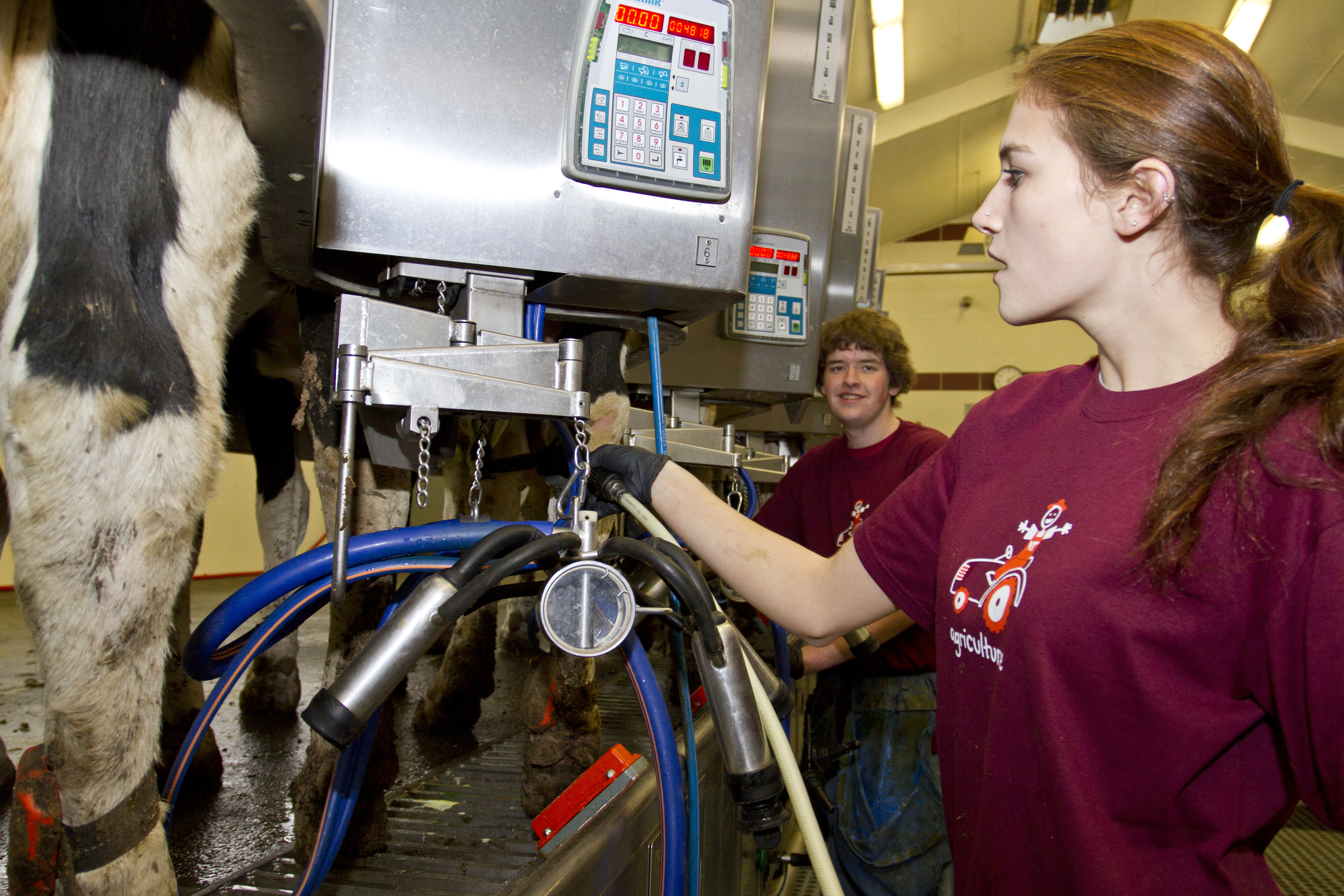D2 at Dietrick Hall to serve milk harvested on campus

Virginia Tech Dining Services has partnered with the Department of Dairy Science to offer “Virginia Tech Milk” in D2 at Dietrick Hall. Whole milk, skim milk, and 1 percent chocolate milk will all be offered.
Students will harvest the milk on campus from the herd of dairy cows at Virginia Tech’s Dairy Center. The milk will then be pasteurized by the James River Department of Agribusiness and served through the milk dispensers at D2 beginning Tuesday, Jan. 22 -- the first day of the spring semester.
This project marks another positive step for Dining Services’ sustainability initiatives. Ted Faulkner, director of Dining Services, said the move towards more sustainable practices was largely influenced by feedback from students.
“Students frequently request more locally sourced food,” Faulkner said. “This partnership is just another way Dining Services is listening to the student voice.”
Dining centers have been using meats purchased from the College of Agriculture and Life Sciences’s Meat Science Center for over two years, and the university’s Kentland Farm provides local produce through the Dining Services Garden at Kentland Farm.
“We are fortunate to have so many resources available to us as a land-grant university,” said Dining Services Sustainability Coordinator Rial Tombes. “We’ve fostered great partnerships with the Meat Science Center for meats sourced from campus, with Kentland Farm to source produce grown just off campus, and now with Dairy Science to supply milk from our own cows.”
The on-campus Dairy Center houses a teaching and research free-stall barn with a milking parlor.
“This will be the highest quality milk served on campus,” said Shane Brannock, the dairy farm superintendent. The milk produced and harvested at the dairy consistently surpasses Department of Agriculture standards. Though milk is always tested once it reaches the processing facility, Virginia Tech’s dairy also tests its milk before shipping for quality assurance and research purposes.
The Dairy Center has a longstanding relationship with the James River Department of Agribusiness, a Virginia Department of Corrections facility where offenders work with officers and staff to complete jobs. Through the processing, pasteurization, and distribution work they complete to sell milk from Virginia Tech’s dairy, the offenders gain valuable work experience that helps them obtain employment once released.
For several years, milk has been harvested at Virginia Tech, sent to James River Department of Corrections facilities for processing, and sold to various agencies. With Virginia Tech’s sustainability efforts on the rise, Dining Services and Dairy Science began working together to serve the milk on campus.
“The students, campus community, Dining Services, and animal science have all benefited from these partnerships,” said Brannock. “It’s high time for us all to benefit from a partnership with Dairy Science.”
Similar to the Meat Science Center and Kentland Farms, the Dairy Center supports the university’s focus on teaching, extension, and research. Dairy science classes meet at the dairy for at least one lab each week, and 10 to 15 students work in the dairy each semester. These students work directly in the milking parlor, harvesting milk and feeding the herd.
“Working at Virginia Tech’s dairy allowed me to apply and relate what I was learning in the classroom to actual animals and the milking process,” said Katie Rubilotta of Westminster, Ma., a sophomore majoring in dairy science and animal and poultry science in the College of Agriculture and Life Sciences. Rubilotta is looking forward to seeing the milk she helps harvest served on campus. “Many aren’t even aware that Virginia Tech has a dairy. I hope that it may educate students and perhaps even spark their interest as to where and how their food is harvested,” Rubilotta added.
Brannock welcomes tours of the dairy facilities. Dining Services and the Dairy Center will host three tours of the dairy between the beginning of the semester and March. Those interested may visit the Farms and Fields Project Blog for dates and to register for a tour.
Dedicated to its motto, Ut Prosim (That I May Serve), Virginia Tech takes a hands-on, engaging approach to education, preparing scholars to be leaders in their fields and communities. As the commonwealth’s most comprehensive university and its leading research institution, Virginia Tech offers 240 undergraduate and graduate degree programs to more than 31,000 students and manages a research portfolio of $513 million. The university fulfills its land-grant mission of transforming knowledge to practice through technological leadership and by fueling economic growth and job creation locally, regionally, and across Virginia.









